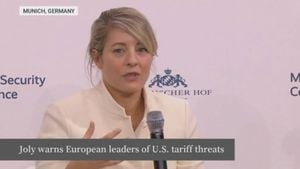The Trump administration is reviving controversial immigration measures as part of its plan to tighten border security and address rising concerns over illegal immigration and public health. This renewed push follows the expiration of Title 42 under President Joe Biden, which allowed for the rapid expulsion of migrants at the U.S.-Mexico border due to health risks associated with the COVID-19 pandemic.
According to CBS News, the Trump administration is eager to strengthen security enforcement again. Internal documents suggest the Centers for Disease Control and Prevention (CDC) is set to issue guidance stating the necessity of these policy re-implementations due to public health risks posed by immigrants entering without adequate vetting. This reflects former President Donald Trump’s longstanding hardline stance on immigration, emphasizing the connection between health risks and border entry.
The impending reentry of Title 42 aims to prevent various diseases, including tuberculosis, from entering the United States. Public health has been cited as one of the key reasons behind this revival, showcasing the administration's desire to control the narrative surrounding immigration amid health crises.
Transitioning from health concerns to enforcement, The Trump administration's focus has also extended to the deportation of unaccompanied migrant children. An internal memo obtained by Reuters detailed plans to track down these vulnerable children, outlining strategies based on priority groups such as flight risk or public safety concerns. The enforcement plan reportedly commenced planning on January 17. While no start date for actual enforcement was provided, the strategic focus signals serious intent.
ICE, the agency tasked with immigration enforcement, is preparing to categorize these unaccompanied minors based on data gleaned from several government records. Some of these decisions could dramatically affect children without parents, highlighting the urgency for humanitarian support to address their needs.
Notably, many nonprofit organizations have taken interest in these developments. The Acacia Center for Justice, which assists thousands of migrant children, expressed concern yet relief as it welcomed the lifting of the stop-work order on providing legal services to unaccompanied minors. Shaina Aber, the executive director of the center, shared, “We welcome the news...that the stop-work order on Acacia’s Unaccompanied Children Program has been lifted.” She noted the return of full legal service provisions is instrumental for safeguarding the rights of these vulnerable children.
The stark measures presented by the Trump administration are framed amid broader electoral discussions on immigration. With illegal immigration taking center stage leading up to 2024 elections, many voters appear to feel Trump would manage this issue more effectively than other candidates, such as former Vice President Kamala Harris. This sentiment may empower the administration's determination to reposition such policies back on the national agenda.
Critics, including former immigration officials, have voiced considerable concern over the intentions behind these aggressive policies. Theresa Cardinal Brown, who served under multiple administrations, stated, “It's clear they're just sort of pulling out all the stops, and the goal is literally stopping people from entering the United States, not processing anybody under the immigration law.” Her comments highlight skepticism about the humanitarian breakdown these policies might enforce on families desperate for asylum.
The juxtaposition of public health justification with stringent deportation actions raises serious ethical questions, particularly surrounding the treatment of unaccompanied minors. Critics argue this could lead to detrimental psychological and social effects on children, who already lack the necessary support systems as they navigate immigration processes.
These reinstated measures indicate possible shifts not just within immigration policy but also reflect greater debates on public health and safety, exacerbated by the COVID-19 pandemic’s far-reaching effects. This renewed focus on border security under the Trump administration highlights the broader friction between addressing humanitarian needs and maintaining national security.
Overall, as the 2024 elections approach and public sentiments grapple with immigration issues, the actions of the Trump administration signify not only immediate changes but also long-term ramifications on policy direction and treatment of one of the nation’s most vulnerable populations.



